Overview
The article "10 Essential Features for Your Ecommerce Mobile App" addresses a common challenge faced by many tech startup founders: creating a mobile application that truly resonates with users. In today’s competitive ecommerce landscape, it’s easy to feel overwhelmed by the multitude of features that are often touted as essential. This can lead to frustration, especially when trying to balance functionality with user experience.
However, understanding the critical elements that enhance both functionality and user experience can alleviate some of that pressure. The article outlines key features such as:
- Comprehensive branding
- User experience design
- Security measures
- Payment integration
- Analytics tools
- Push notifications
- Personalization
- Customer support
- Social media integration
- The importance of regular updates
Each of these elements plays a significant role in fostering user engagement and satisfaction, ultimately driving sales growth.
By focusing on these essential features, you can create a mobile app that not only meets user expectations but also builds a loyal customer base. Remember, the journey of developing an ecommerce mobile app can be challenging, but with the right tools and insights, you can navigate it successfully. Embrace these recommendations, and watch as your app flourishes in a competitive market, bringing joy to both you and your users.
Introduction
In a world where online shopping is rapidly evolving, many ecommerce mobile app developers face the challenge of creating an experience that truly resonates with users. As competition intensifies and consumer expectations rise, it can feel overwhelming to navigate the essential functionalities that are critical to success.
From robust branding and intuitive design to seamless payment integration and personalized user experiences, the stakes are high. What are the must-have elements that not only enhance customer satisfaction but also cultivate loyalty in this dynamic landscape?
This article invites you to explore ten vital features that every ecommerce mobile app should incorporate to thrive in 2025 and beyond. Together, we can ensure that businesses not only meet but exceed the demands of today’s savvy shoppers, fostering a nurturing environment for growth and connection.
RNO1: Comprehensive Branding and UX Design for Ecommerce Apps
In today's fast-paced digital landscape, many tech startup founders face the challenge of establishing a strong brand presence through an ecommerce mobile app in the eCommerce sector. The pressure to stand out can feel overwhelming, especially when considering that eCommerce sales are projected to surpass 5.7 trillion U.S. dollars globally. This reality underscores the need for effective branding in mobile applications, which can significantly enhance user engagement. A well-executed branding strategy not only attracts users but also fosters meaningful interactions, as evidenced by studies showing that $1 spent on UX can yield an astonishing 9,900% return on investment.
At RNO1, we understand the unique needs of fast-moving brands. Our innovative approach combines cutting-edge branding strategies with advanced UX principles, empowering clients to cultivate a robust digital presence that resonates with their target audience. For instance, our partnership with Loliware resulted in over one million distinct website visits following their appearance on Shark Tank, illustrating the profound impact of strategic branding.
Industry leaders echo the importance of branding in digital interactions. As Carson Dean insightfully remarks, "Ecommerce allows businesses to reach customers worldwide, breaking geographical barriers previously impossible with traditional brick-and-mortar stores." This sentiment serves as a reminder for companies to invest in strong, recognizable identities that build trust and loyalty among consumers.
Effective branding strategies in an ecommerce mobile app often incorporate personalized experiences and cohesive design elements that reflect the brand's values. Our integrated AI chat application project exemplifies this, showing how thoughtful design can elevate user satisfaction. Over 70% of participants reported greater efficiency compared to using separate chat services, while gearUP Sports experienced a 66% reduction in manual intervention, showcasing the benefits of effective branding and UX design.
By prioritizing branding and UX, RNO1 positions its clients to thrive in the competitive online retail environment, ensuring they meet the evolving expectations of today's consumers. We are here to support you in navigating these challenges, helping you that not only stands out but also connects deeply with your audience.
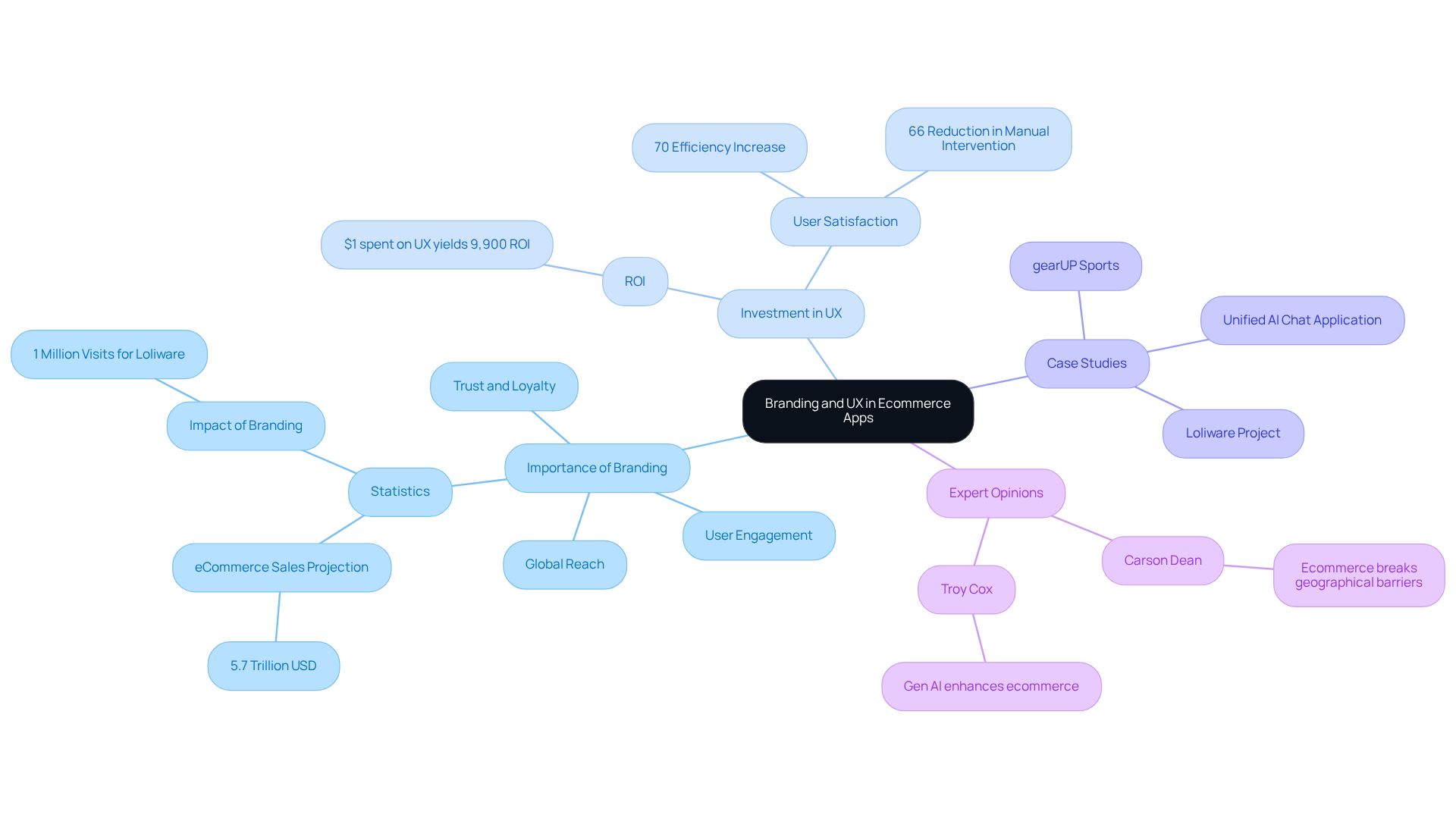
User Experience (UX): Streamlined Navigation and Intuitive Design
In the competitive realm of ecommerce mobile apps, many founders face the challenge of ensuring customer satisfaction through efficient navigation and intuitive design. It’s a common concern: research shows that 21% of individuals abandon their carts due to complicated or lengthy checkout experiences, contributing to an alarming average cart abandonment rate of roughly 70%. This can be frustrating, as it not only impacts sales but also the overall customer experience. However, by reducing the number of taps needed to finalize a purchase, companies can significantly enhance customer satisfaction and lower these abandonment rates.
Industry leaders recognize the importance of intuitive design in addressing these challenges. As Steve Jobs insightfully stated, 'Design is not just what it looks like and feels like. Design is how it works.' This philosophy resonates deeply in mobile shopping, where customers expect . RNO1 embodies this approach, partnering with various brands to create engaging digital experiences. For instance, their collaboration with Shopify Flow to automate reminders and upsells effectively engages customers and recovers abandoned carts. Moreover, RNO1 employs participant testing and iterative design processes, ensuring that the final product truly meets the needs of its audience.
Beyond functionality, the emotional connection fostered by intuitive design can lead to increased customer loyalty. Studies show that loyal customers are five times more likely to repurchase, boosting profits by up to 95%. This highlights that investing in streamlined navigation and intuitive design within an ecommerce mobile app is not merely about aesthetics; it’s a strategic method to enhance customer satisfaction and drive sales in the ever-evolving online retail environment. By prioritizing these elements, RNO1 not only addresses the immediate concerns of founders but also nurtures a lasting relationship with their customers.
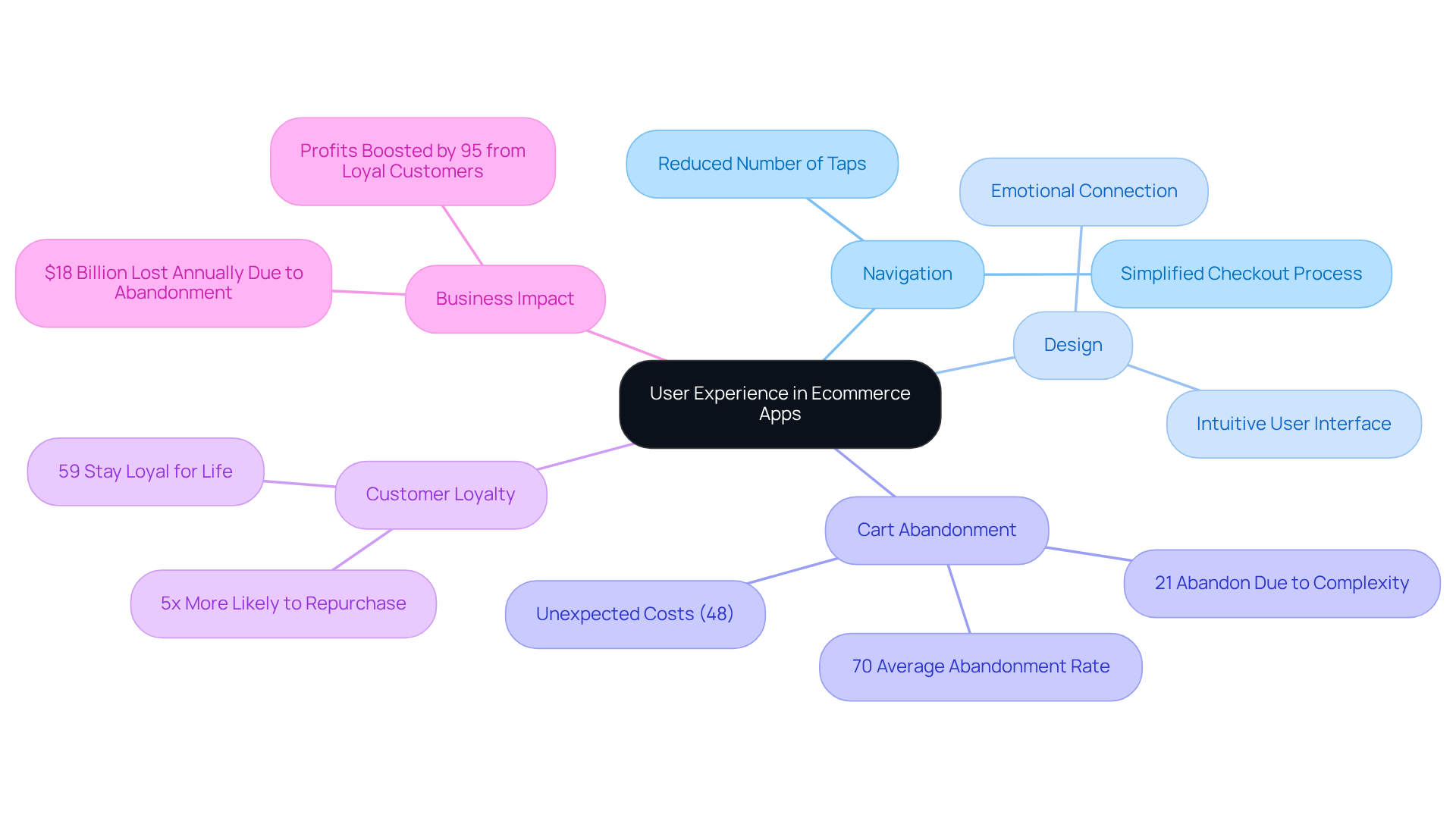
Security Features: Implementing SSL and Data Encryption
In today's digital landscape, the safety of client data is a pressing concern for many. eCommerce mobile apps face the challenge of ensuring that sensitive information, such as credit card details and personal data, is well protected. This fear can be overwhelming, as the implications of a data breach can affect not just finances but also personal trust and security.
However, there is hope. By implementing SSL (Secure Socket Layer) certificates and robust data encryption protocols, companies can create a secure environment for their users. SSL works by encrypting the data sent between individuals and servers, effectively safeguarding this vital information.
When companies prioritize these security features in their ecommerce mobile app, they not only protect their clients but also foster a sense of trust. This trust is crucial, as it encourages individuals to complete transactions with confidence, knowing that their data is secure.
Together, we can create a safer online shopping experience, reassuring clients that their information is in good hands.
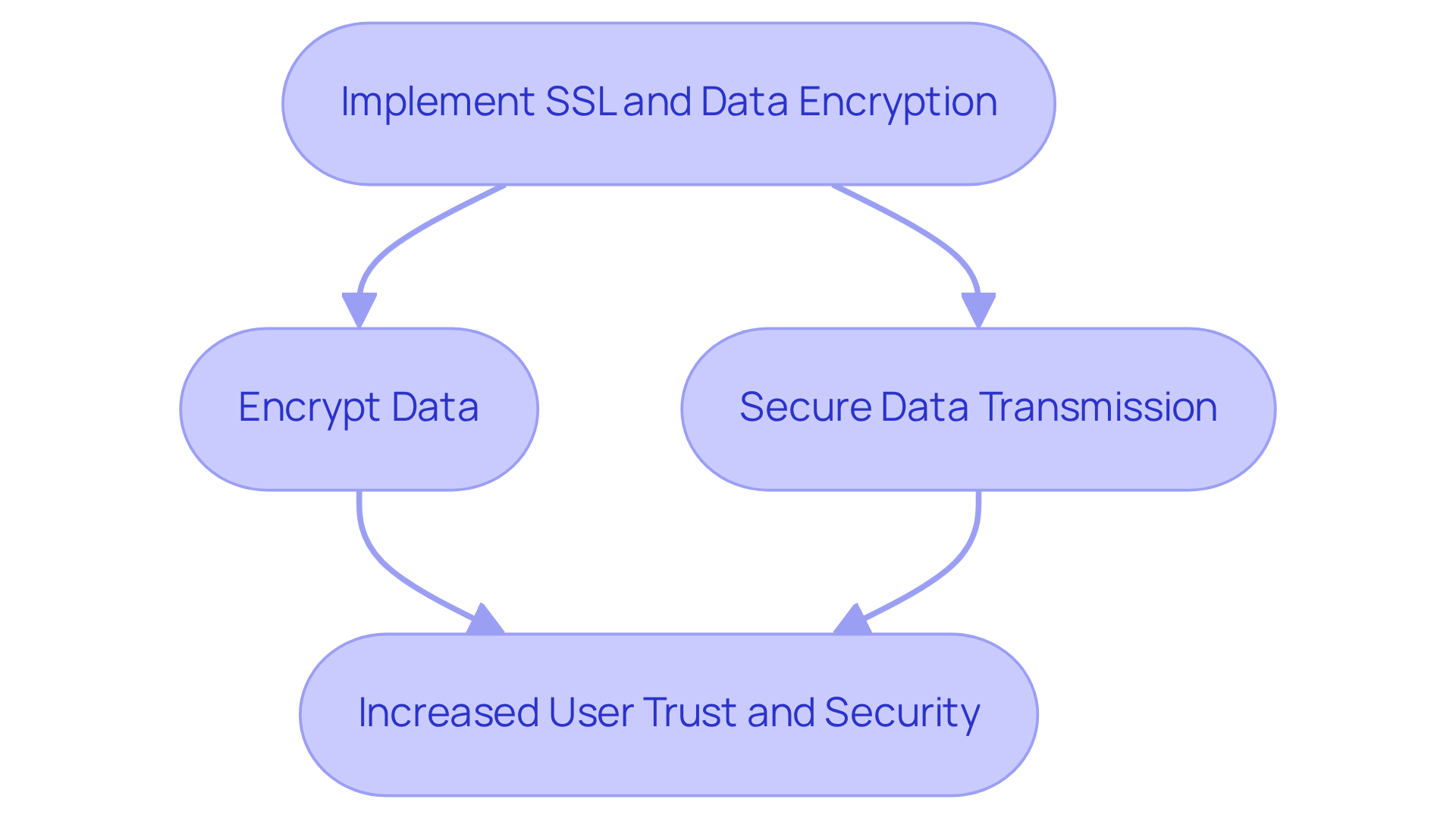
Payment Integration: Supporting Multiple Payment Gateways
Incorporating various payment gateways into an ecommerce mobile app can feel overwhelming, especially when trying to meet the diverse preferences of customers. Many founders worry about how to enhance the shopping experience while keeping their users satisfied. By offering options such as credit cards, PayPal, and digital wallets like Apple Pay and Google Pay, you can simplify the checkout process and significantly reduce friction. This flexibility not only nurtures user satisfaction but also boosts conversion rates.
When consumers see their preferred payment methods available, they are more likely to complete their transactions. Research even shows that providing multiple payment options can lead to a notable increase in completed purchases, aligning with modern consumer expectations for convenience and security. Moreover, integrating various payment gateways allows businesses to accommodate cross-border transactions, enabling you to reach a broader audience while ensuring compliance with international regulations.
At RNO1, we understand the importance of creative performance marketing strategies that guarantee these integrations are functional and enhance your digital brand presence. As mobile payments continue to expand, prioritizing a seamless payment integration strategy within an ecommerce mobile app that supports cross-platform compatibility becomes essential for any online retail application aiming to succeed in 2025 and beyond. This reflects our commitment to creating intentional and profitable digital commerce experiences.
Selecting the right payment service provider (PSP) is critical for effective payment integration, as it can facilitate smooth operations and enhance security. Additionally, seamless API integration is vital for overcoming payment integration challenges, ensuring that various payment systems work together efficiently. We are here to support you in navigating these complexities, helping you create a nurturing and .
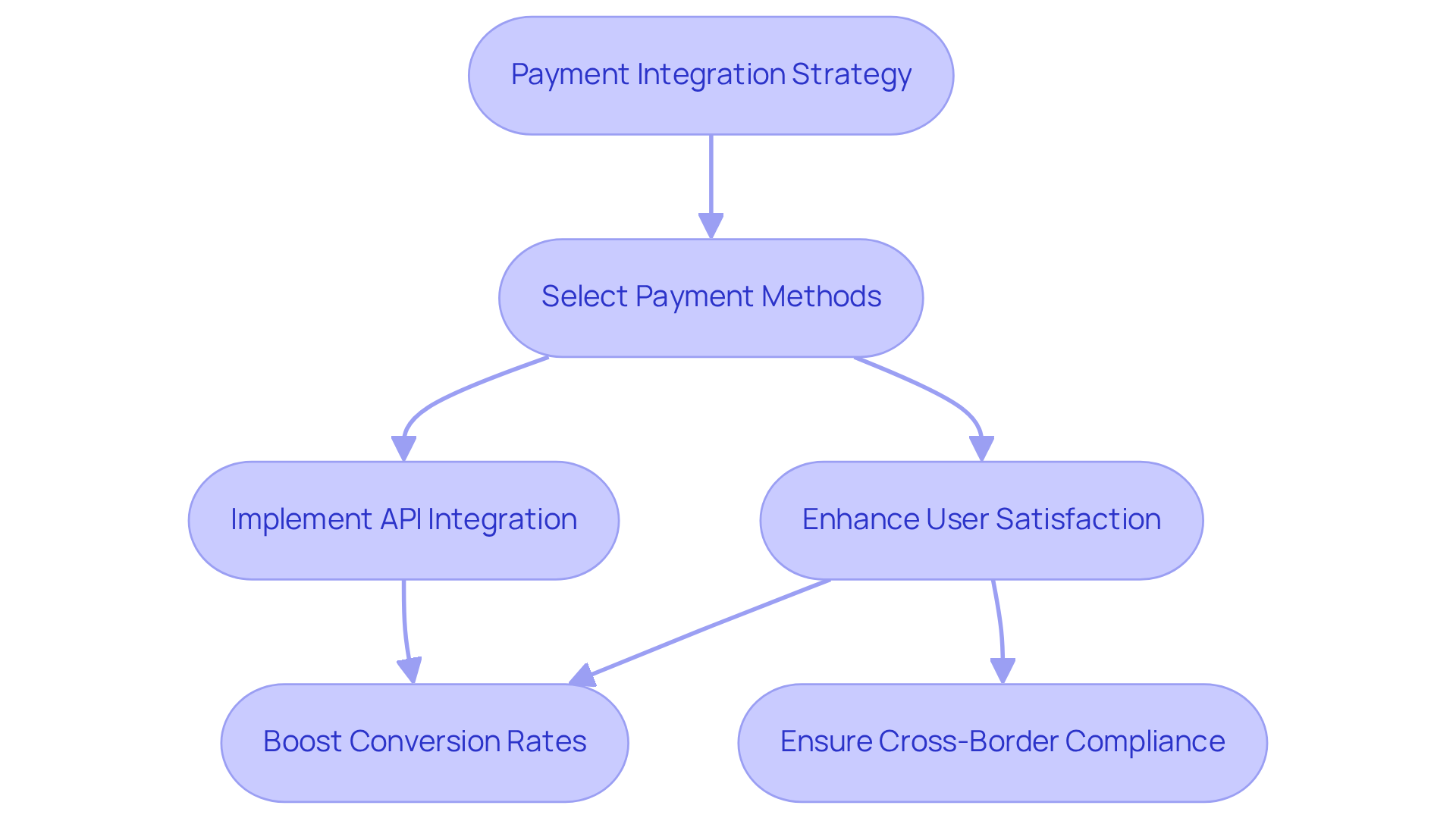
Analytics Tools: Tracking User Behavior and App Performance
Incorporating analytics tools into ecommerce mobile apps presents a significant challenge for many brands striving to understand consumer behavior and app performance. The struggle to track essential metrics such as audience engagement, conversion rates, and drop-off points can lead to missed opportunities for improvement. This is where the pain points become apparent: without the right insights, brands may find it difficult to enhance their applications effectively, ultimately impacting sales and customer loyalty.
However, there is hope. By adopting a data-driven strategy, brands can foster ongoing improvements in the client experience, which is crucial for nurturing customer loyalty. As we see in RNO1's collaboration with Cirkul, understanding user behavior is not merely about collecting data; it involves transforming those insights into actionable strategies that elevate overall app performance. For instance, tools like Conjura, which offers unique features such as contribution profit analysis by SKU, and Triple Whale, known for its pixel tracking technology that provides accurate attribution across channels, empower companies to monitor ad spend at the SKU level and evaluate product profitability.
This level of insight is invaluable for online retailers aiming to thrive in a competitive environment. It enables them to make informed choices that directly impact their profitability. To effectively implement consumer behavior tracking, companies should:
- Regularly review their analytics data
- Adjust their strategies based on feedback and performance metrics
- Consider setting specific KPIs to measure the success of their initiatives
By leveraging RNO1's performance marketing expertise, they can hyper-scale their ecommerce mobile app efforts, ensuring they not only survive but flourish in this dynamic landscape. Together, we can navigate these challenges and create a .
![]()
Push Notifications: Enhancing User Engagement and Retention
Push notifications serve as a vital lifeline between brands and consumers, creating an essential opportunity for enhanced engagement and retention. However, many brands struggle to communicate effectively, leading to missed chances for connection. Sending timely and relevant notifications—like personalized offers, reminders for abandoned carts, or updates on new products—can encourage individuals to revisit the app and complete their purchases. Personalization is particularly crucial; research shows that 26% of individuals receiving push notifications within three months of opting in exhibit three times higher retention rates, and 65% return to the app when notifications are activated. Yet, it’s important to find the right balance; nearly 50% of individuals find overwhelming and annoying.
To foster a nurturing relationship with users, consider these best practices for utilizing push notifications in mobile apps:
- Personalization: Craft notifications that resonate with user behavior and preferences, enhancing relevance and engagement.
- Timing and Context: Deliver notifications at optimal moments to ensure they are welcomed rather than disruptive.
- Actionable Content: Include clear calls to action within notifications, encouraging interaction and driving conversions.
- Frequency Management: Aim for a manageable frequency of 2-5 notifications per week; consumers appreciate fewer notifications to avoid the temptation to disable them.
- Feedback Collection: Actively seek feedback from users to refine notification strategies, fostering trust and a sense of community.
Marketing professionals highlight the significance of these strategies. For instance, Ayat Shukairy emphasizes that effective push notifications can greatly enhance engagement and click-through rates. By implementing these thoughtful methods, companies can create a more captivating mobile environment, ultimately leading to improved customer retention and satisfaction. Together, we can nurture these connections and foster a thriving community.

Personalization: Tailoring User Experience Based on Preferences
In the realm of ecommerce mobile apps, the challenge of creating an engaging experience for individuals is ever-present. Many brands grapple with how to truly connect with their customers. Personalization emerges as a crucial solution, allowing brands to utilize consumer data effectively. By customizing product suggestions, content, and promotions to align with individual preferences, brands not only enhance client satisfaction but also significantly improve conversion rates. It's heartening to note that studies reveal 63% of marketers see increased conversion rates thanks to personalization, highlighting its vital role in meeting customer expectations. Imagine companies that embrace robust personalization strategies achieving a revenue lift of 10 to 15 percent, with some even experiencing increases as high as 25 percent.
As we look towards the future, current trends show a growing reliance on advanced analytics to refine these personalization efforts. By 2025, the focus on utilizing customer data will continue to evolve, with 74% of eCommerce firms already implementing personalization initiatives in their ecommerce mobile app. Take Best Buy, for instance; their approach to based on customer behavior ensures that regular shoppers encounter relevant products and promotions tailored to their needs.
Moreover, dynamic content customization, as demonstrated by Wayfair, adapts the shopping journey according to customer interactions, leading to greater satisfaction and engagement. Marketing experts stress that effective personalization is no longer just a nice-to-have; it has become a fundamental expectation among consumers. As industry leaders have pointed out, organizations that prioritize personalization can significantly enhance customer lifetime value and drive double-digit revenue growth. By recognizing and responding to personal preferences, companies can foster engaging interactions that not only attract but also retain clients in a fiercely competitive market.
In this journey of personalization, let’s embrace the power of connection and understanding, ensuring that we meet the emotional and professional needs of every customer.
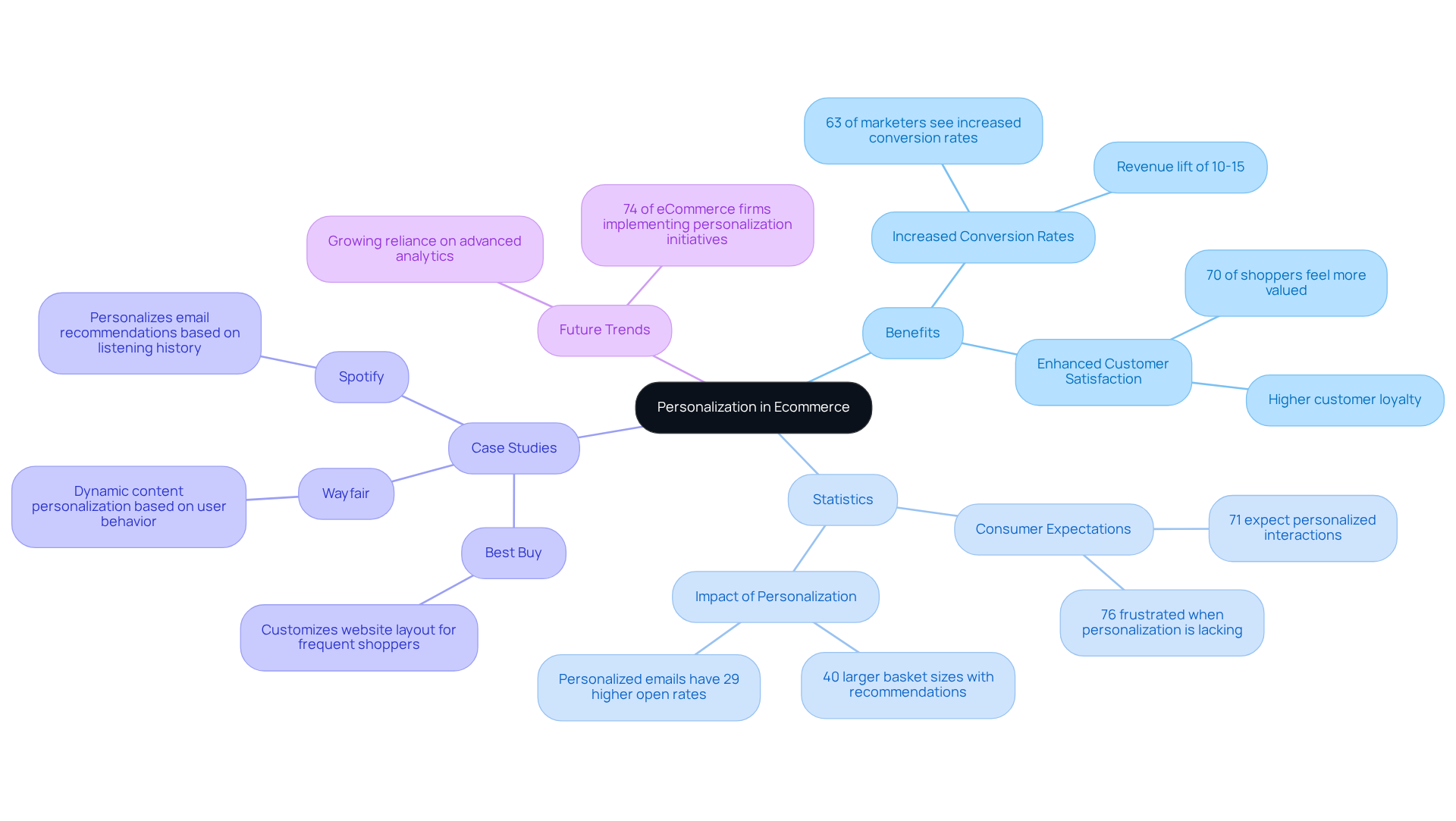
Customer Support: Integrating Live Chat and Help Desks
In the fast-paced world of eCommerce, many customers face the problem of feeling unsupported and frustrated when they encounter issues while shopping. This lack of immediate assistance can lead to dissatisfaction, causing them to abandon their carts and seek alternatives.
However, integrating live chat and help desk features into mobile apps can truly transform this experience. By offering real-time support, companies can promptly address customer inquiries, effectively reducing frustration and increasing satisfaction. A proactive approach to customer support not only encourages higher retention rates but also nurtures a positive image.
Companies that implement effective customer service strategies often witness a remarkable increase in customer loyalty. In fact, statistics indicate that:
- 70% of unhappy customers whose problems are resolved are willing to shop with a business again.
Moreover, personalized interactions can enhance trust, as many customers are open to sharing personal information for better service, provided their data is handled responsibly.
By emphasizing customer support functions, companies can create a smooth shopping journey in their ecommerce mobile app that resonates with the evolving needs of mobile consumers. This ultimately and fosters lasting connections.
Let's work together to ensure that every customer feels valued and supported throughout their shopping experience.
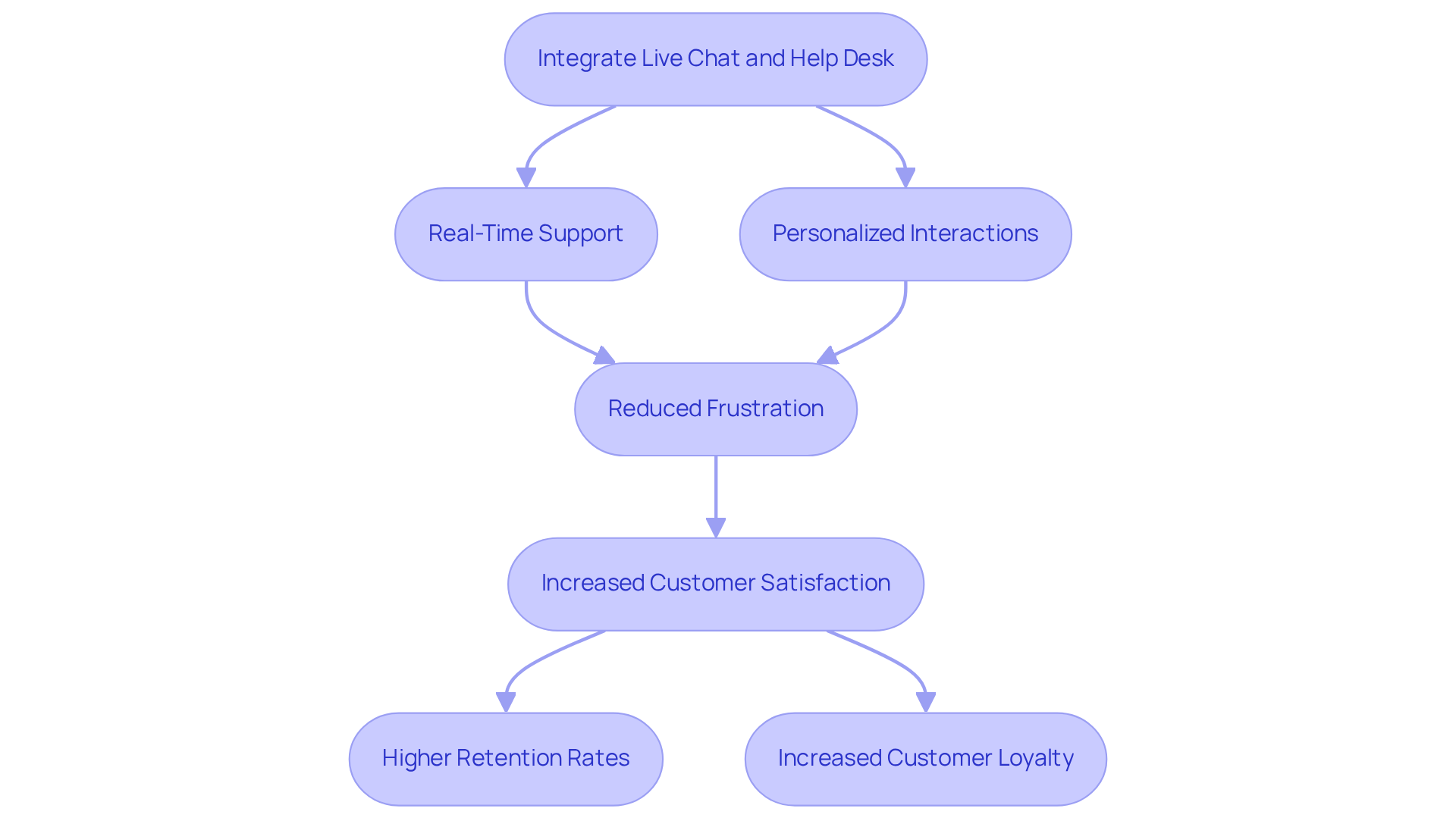
Social Media Integration: Facilitating Sharing and Brand Awareness
Incorporating social media functionalities into ecommerce mobile apps addresses a common challenge: how to engage customers meaningfully. Many individuals wish to share their favorite products and memorable moments but often feel disconnected from the brands they love. Choices like 'Share on Facebook' or 'Tweet this product' not only enhance engagement but also harness the power of consumer-generated content, significantly increasing visibility. This organic growth strategy is essential for establishing a strong online presence in today’s competitive landscape.
At RNO1, we understand the importance of delivering real results through collaborative strategies, especially in social media campaigns. For instance, targeted initiatives have proven effective, as demonstrated by Care Connect, which reached over 500,000 people in Rwanda and achieved a remarkable 65% increase in caregiver bookings within just three months. Our tailored marketing solutions played a crucial role in this success, illustrating how strategic marketing can enhance social media integration.
By encouraging individuals to share their experiences, companies can attract new clients and foster a community around their products, ultimately boosting sales and enhancing customer loyalty. User feedback has shown high satisfaction with the platform’s ease of use and the quality of caregivers provided, reinforcing the positive outcomes of . Additionally, the seamless connection between patients and caregivers facilitated by the ecommerce mobile app builds trust and reliability, underscoring the significance of social media features in promoting brand awareness.
Together, we can create an environment where sharing and connection flourish, making the journey not just about transactions but about building relationships and community.
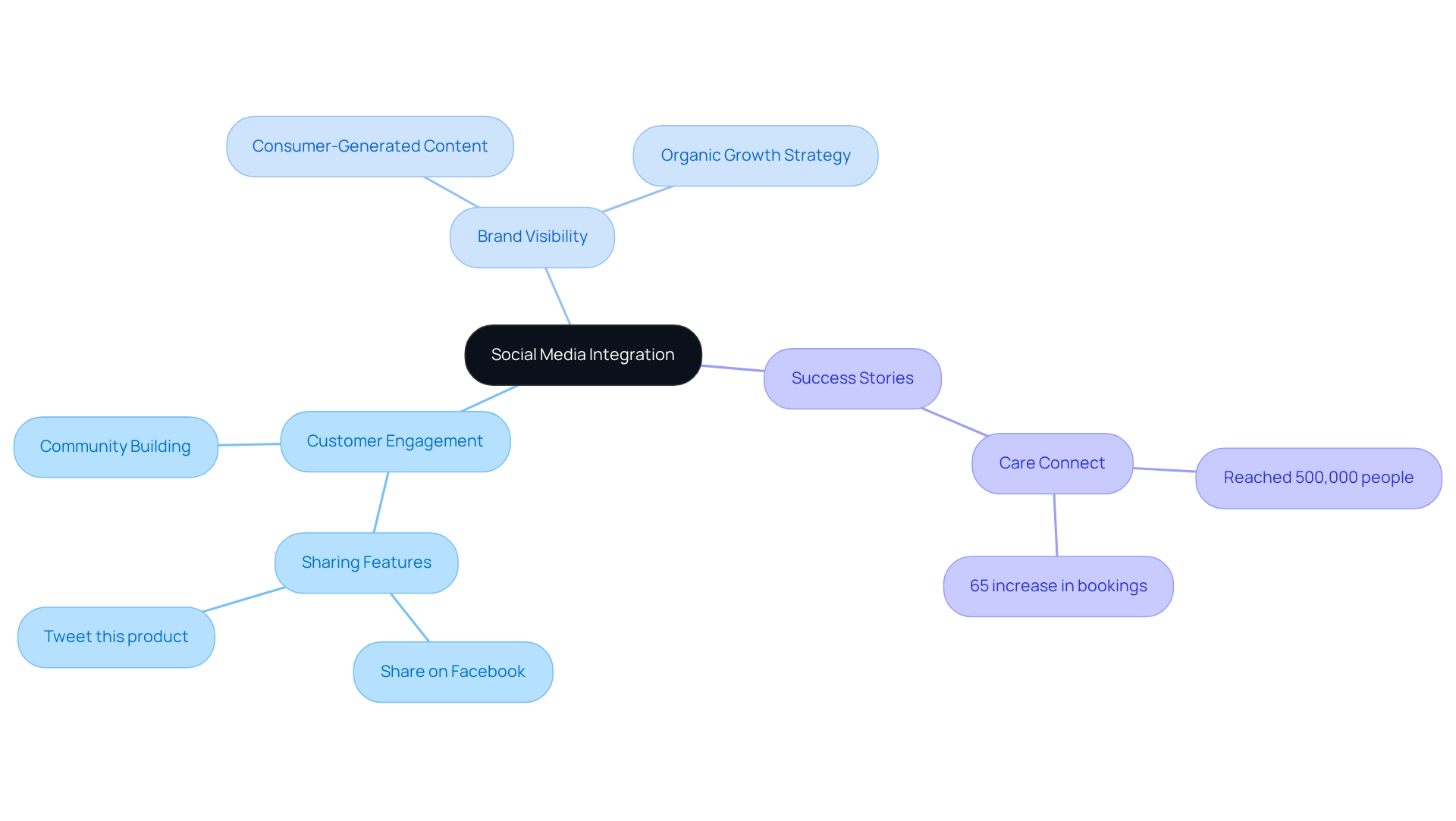
Regular Updates: Ensuring Functionality and Relevance
To ensure optimal performance and foster customer satisfaction, it’s vital for ecommerce mobile apps to prioritize . Many of us have experienced the frustration of using an app that feels outdated or buggy. These updates are not just about fixing problems; they also refresh content and features, keeping the app relevant in a fast-paced technological landscape.
As we look ahead to 2025, users expect applications to evolve alongside technological advancements. Studies show that an ecommerce mobile app receiving regular updates can see retention rates soar by four times compared to those that are seldom updated. Additionally, frequent updates to the ecommerce mobile app contribute to a remarkable 75% satisfaction rate among users, underscoring the importance of regular maintenance.
By aligning app features with consumer expectations and industry trends, companies can significantly boost engagement and build lasting loyalty. An expert once shared, 'Regular updates are crucial for mobile apps because they enhance security, improve performance, fix bugs, add new features, and ensure compatibility with the latest devices and operating systems.' Ignoring updates can lead to dissatisfaction among users, who may encounter faulty or dysfunctional features.
This commitment to continuous improvement not only keeps the app functional but also reinforces the brand's dedication to providing an exceptional user experience. By implementing a structured update schedule, businesses can ensure timely bug fixes and regular feature additions, further enhancing the vitality of their applications.
Let's embrace the journey of improvement together and create a better experience for everyone.
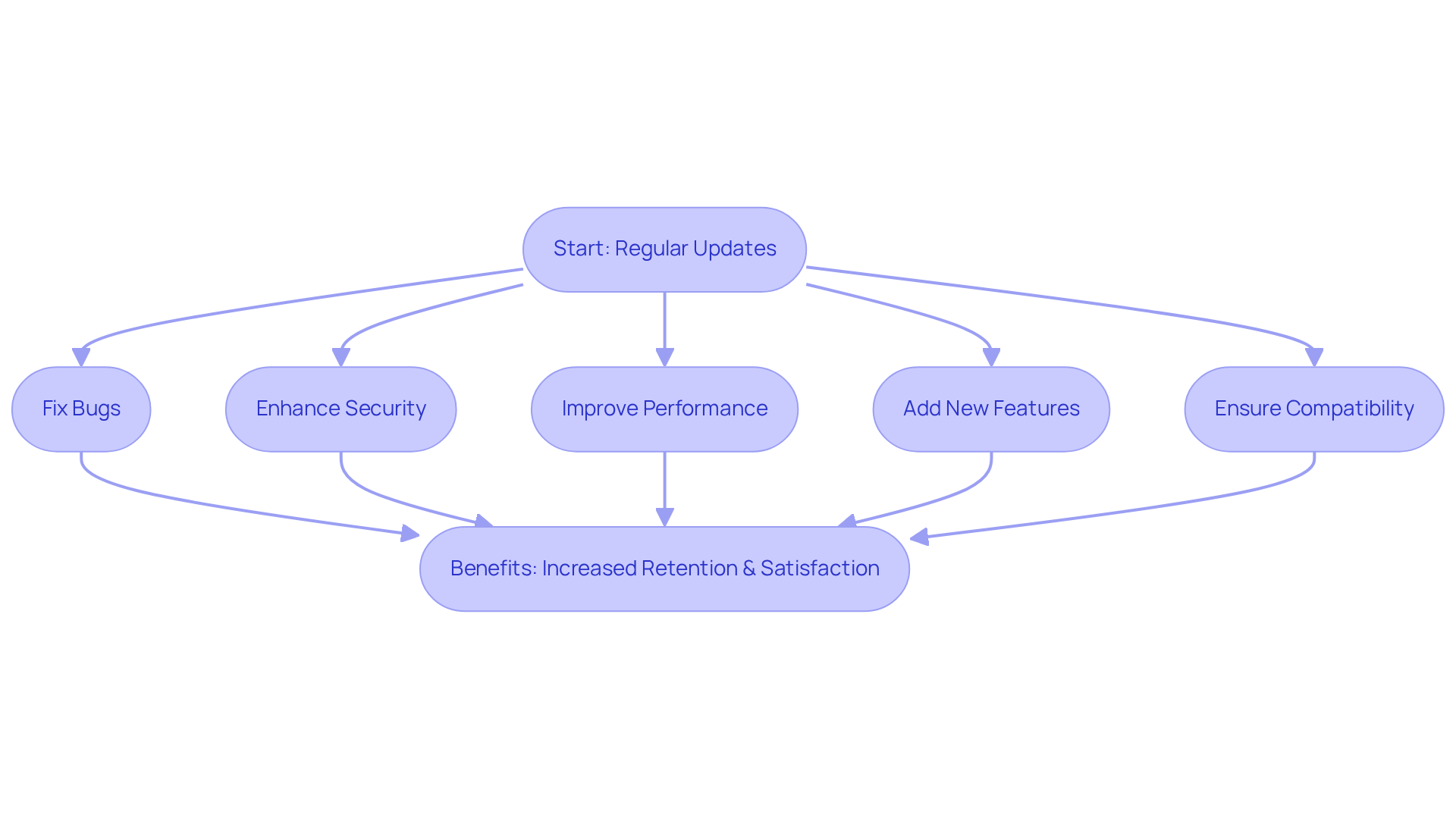
Conclusion
In the competitive landscape of ecommerce, many businesses face the challenge of creating a mobile app that truly resonates with users. This can lead to frustration when user engagement and retention fall short. However, by focusing on essential features that enhance user experience, companies can turn this challenge into an opportunity for growth. Prioritizing comprehensive branding, intuitive UX design, robust security measures, and effective payment integration can help businesses develop a mobile application that not only meets but exceeds consumer expectations.
Imagine the relief of knowing that your app is equipped with the right tools to foster loyalty and increase sales. Integrating analytics tools, offering personalized experiences, and providing proactive customer support can significantly strengthen your app's relationship with its users. Key insights reveal that features like streamlined navigation can reduce cart abandonment, while implementing SSL and data encryption ensures user safety. Additionally, incorporating push notifications can enhance user engagement, creating a more dynamic experience.
Embracing personalization strategies allows brands to connect more deeply with their audience, making users feel valued and understood. Regular updates ensure that your app remains relevant and functional in a rapidly evolving digital environment. As we look towards 2025 and beyond, it becomes clear that the path to a successful ecommerce mobile app lies in understanding and implementing these essential features.
As technology continues to advance, it’s vital for businesses to adapt their strategies to meet the changing needs of consumers. By investing in these critical functionalities, companies can stand out in a crowded marketplace and build lasting relationships with their customers. Together, we can foster a thriving digital commerce ecosystem that not only meets the demands of today but also nurtures the future of ecommerce.
Frequently Asked Questions
Why is effective branding important for ecommerce mobile apps?
Effective branding is crucial for ecommerce mobile apps as it enhances user engagement, attracts users, and fosters meaningful interactions. A strong brand presence can significantly impact sales, with studies indicating that every $1 spent on UX can yield a 9,900% return on investment.
How can personalized experiences improve user satisfaction in ecommerce apps?
Personalized experiences, along with cohesive design elements that reflect a brand's values, can elevate user satisfaction. For instance, RNO1's integrated AI chat application project demonstrated that over 70% of participants reported greater efficiency, showcasing how thoughtful design can enhance the user experience.
What are the consequences of complicated checkout processes in ecommerce?
Complicated or lengthy checkout processes lead to high cart abandonment rates, with research showing that 21% of individuals abandon their carts for these reasons. This impacts sales and overall customer satisfaction.
How does intuitive design contribute to customer loyalty in ecommerce?
Intuitive design fosters emotional connections with users, which can lead to increased customer loyalty. Studies indicate that loyal customers are five times more likely to repurchase, boosting profits by up to 95%.
What security measures should be implemented in ecommerce mobile apps?
Ecommerce mobile apps should implement SSL (Secure Socket Layer) certificates and robust data encryption protocols to protect sensitive information, such as credit card details and personal data, ensuring a secure environment for users.
How does RNO1 support ecommerce brands in enhancing their digital presence?
RNO1 combines innovative branding strategies with advanced UX principles to help ecommerce brands establish a strong digital presence that resonates with their target audience, ultimately positioning them to thrive in the competitive online retail environment.




